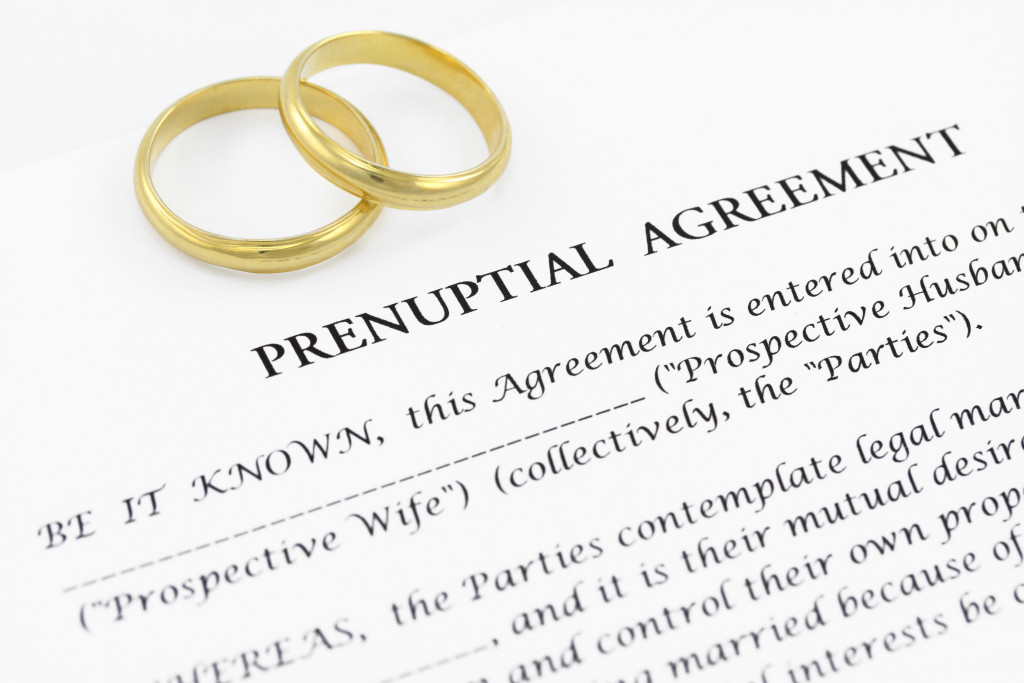- A prenuptial agreement outlines asset division in case of divorce, offering financial security, but it may cause discomfort and isn’t guaranteed legally binding.
- The prenup should ideally be signed several months before the wedding to prevent allegations of coercion or duress and enhance its enforceability.
- The agreement should fully disclose all assets, liabilities, income, and provisions for future changes, ensuring fairness and realism.
- Adherence to the prenup’s terms is vital for its enforceability; any deviation should be undertaken with mutual consent and legal guidance.
Planning for the future and protecting your assets are important considerations before entering the marriage bond. As you prepare to say “I do,” it’s worth considering the legal implications of marriage and the value of a prenuptial agreement. A prenup is not a sign of mistrust or an anticipation of failure; rather, it’s a practical step in managing your financial landscape. Understanding the legal actions necessary to ensure your prenup is valid and enforceable is crucial, offering both parties financial security.
Understand What a Prenup Is
A prenuptial agreement, often called a ‘prenup’, is a formal contract a couple creates before their wedding or civil partnership. It serves as a written agreement to address financial matters and other considerations in case of a future separation or divorce. This agreement outlines the ownership of their assets and the division of them in case of a divorce or dissolution.
By formalizing their financial arrangements, couples can proactively address potential issues and ensure clarity and fairness in the future. This legal contract can encompass all property, debts, income, and other assets owned by each individual. It is not necessarily just for the wealthy; anyone with personal or business assets, liabilities, property, inheritance, or children from a previous marriage may find a prenup beneficial.
The primary purpose of a prenup is to protect both parties and prevent disputes in the event of a relationship breakdown. However, it’s important to note that prenups are not automatically legally binding, and their weight varies in different jurisdictions. Regardless, they are often upheld in courts and can significantly influence judicial decisions regarding asset division. Here are other things to consider:
Weighing the Pros and Cons
Balancing the benefits and potential drawbacks is essential when considering a prenuptial agreement. A major advantage is that a prenup can offer a clear, legally acknowledged agreement regarding asset division, providing financial security and peace of mind. It can ensure each party’s rights and responsibilities are well-defined and protect any inheritance or assets obtained before the marriage.
On the downside, discussing a prenup can be sensitive, potentially causing feelings of discomfort or distrust between partners. Furthermore, a prenuptial agreement can’t anticipate all future changes in a couple’s financial situation.
Finally, as prenups are not guaranteed to be legally binding in every jurisdiction, there’s a risk that they may not be upheld in court. However, with open communication, careful planning, and professional legal advice, a prenuptial agreement can be useful in planning your financial future together.
Consult Reputable Prenup Agreement Lawyers

Before proceeding with a prenuptial agreement, seeking professional legal counsel is critical. Engaging reputable prenup agreement lawyers can ensure that your rights are protected and the agreement is fair and enforceable. These professionals can provide invaluable guidance, helping you navigate prenuptial agreements’ legal intricacies and potential pitfalls.
A proficient lawyer will carefully review all assets and liabilities and construct an agreement that accurately represents your interests. An attorney can also facilitate open communication between partners, fostering understanding and consensus on sensitive issues. While it may seem an additional expense, securing professional legal advice is a prudent investment for your financial future. Remember, each party should have a lawyer to avoid conflict of interest.
Sign Promptly

To prevent any potential allegations of coercion or duress, it’s advisable to sign the prenuptial agreement well in advance of the wedding. Ideally, this should be done several months before the nuptials to allow ample time for the review and negotiation process.
Both parties should fully understand the terms of the agreement and sign it of their own free will. Last-minute signing can cast a shadow of doubt over the agreement’s validity, and in some jurisdictions, it can be a ground for nullification. Therefore, to uphold the enforceability of your prenup, ensure you sign promptly.
Decide What to Include in Your Prenup
In your prenuptial agreement, include all relevant elements that pertain to your financial situation. Begin with a full disclosure of all assets, liabilities, and sources of income. Outline how property acquired during the marriage will be owned or divided, and detail what will happen to premarital assets upon divorce or death.
Specify any arrangements for spousal support. If one or both of you have children from previous relationships, consider including provisions for their inheritance rights. Discuss what might happen to any joint businesses.
Additionally, establish how debts will be handled to avoid one party becoming responsible for the other’s liabilities. It’s also beneficial to address potential changes in circumstances, like a significant increase in income, receiving an inheritance, or retiring. Remember, a prenup should be fair and realistic, addressing the concerns of both parties without promoting the likelihood of divorce.
Ensure Full Disclosure
Full disclosure is a cornerstone of a valid prenuptial agreement. It refers to the complete, honest declaration of all assets, liabilities, and financial interests by both parties before signing the contract. Any attempt to hide or undervalue assets can lead to the agreement being challenged and possibly invalidated in the event of a divorce.
Both partners should provide a comprehensive list of their respective financial situations, including income, real estate, investments, business holdings, retirement accounts, and debts. This not only ensures transparency but also promotes fairness in the agreement.
For this reason, some couples choose to involve a financial adviser to evaluate assets accurately. Remember, full disclosure isn’t just about protecting your interests—it’s a legal obligation that bolsters the enforceability of your prenup.
Strict Adherence to the Prenup’s Terms
Adhering to the terms in your prenuptial agreement is crucial for its enforceability. A breach of terms can challenge or invalidate the agreement in a courtroom scenario. This adherence extends beyond asset division to include any stipulations related to spousal support, handling of debts, or inheritance provisions.
It’s paramount to ensure that all actions, financial or otherwise, comply with the agreement’s terms to maintain its legal weight. Any deviation from the prenup’s terms, particularly those related to financial dealings, should be undertaken only after mutual consent and preferably under the guidance of a legal professional. This strict adherence fosters trust, respect, and fairness, reinforcing the agreement’s purpose of protecting both parties’ interests.
In conclusion, a prenuptial agreement is crucial in safeguarding your financial future. Don’t let discomfort or misunderstandings deter you. Seek professional advice, communicate openly with your partner, and ensure full transparency. Protect your assets and secure peace of mind by starting the process of creating your prenup today.



